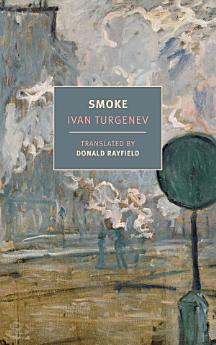Smoke
Jun 2026 · New York Review of Books
Ebook
272
Pages
family_home
Eligible
info
infoThis book will become available on June 9, 2026. You will not be charged until it is released.
About this ebook
A young Russian man, engaged to be married, encounters his former love in a German spa town and is soon enmeshed in a torturous romantic tangle in this graceful, politically tinged love story by a Russian literary great.
Ivan Turgenev’s fifth novel, Smoke, published in 1867, differed from his previous novels, three of which had revolutionary heroes dying dramatically. His new hero, Grigori Litvinov, the most likeable protagonist in nineteenth-century Russian literature, is an intelligent but unremarkable man who returns from agronomical studies in Germany intending to marry then run his father’s neglected estate. He stops in Baden-Baden to meet his fiancée Tatiana and runs into his former love, the now aristocratic Irina, who is staying there with her husband. A dormant erotic passion overwhelms Litvinov; he jilts Tatiana and prepares to elope with Irina: a fatal mistake, yet Turgenev is merciful to his hero, who in time atones for his temporary insanity, realizing that like Voltaire’s Candide, he can only cultivate his garden.
The Russians abroad in Smoke, whether revolutionaries or reactionaries, emerge as hypocritical bigots. Turgenev’s authorial character Potugin denounces both right-wing aristocrats and left-wing radicals—indeed all of Russia—as irredeemably backward. Reactions were furious: Turgenev was forced to stay abroad. Tolstoy said that he loved only fornication, not his country; the poet Tiutchev that he was polluting “the smoke of the fatherland, sweet and pleasant” (a famous line by the playwright Griboyedov).
Smoke shares much with Gustave Flaubert’s Sentimental Education: the novels were written simultaneously; the authors were close friends, equally disillusioned. Flaubert likewise has an unremarkable hero, torn between two women and two political forces, though his monumental novel is more brutal, comparing a besotted lover to someone bringing a bunch of flowers to a brothel. In his novella Torrents of Spring, Turgenev had already described a vulnerable hero robbed of a fiancée by a ruthless aristocratic woman. Smoke is yet more powerful: readers will feel they have not just read, but experienced Litvinov’s trauma.
Ivan Turgenev’s fifth novel, Smoke, published in 1867, differed from his previous novels, three of which had revolutionary heroes dying dramatically. His new hero, Grigori Litvinov, the most likeable protagonist in nineteenth-century Russian literature, is an intelligent but unremarkable man who returns from agronomical studies in Germany intending to marry then run his father’s neglected estate. He stops in Baden-Baden to meet his fiancée Tatiana and runs into his former love, the now aristocratic Irina, who is staying there with her husband. A dormant erotic passion overwhelms Litvinov; he jilts Tatiana and prepares to elope with Irina: a fatal mistake, yet Turgenev is merciful to his hero, who in time atones for his temporary insanity, realizing that like Voltaire’s Candide, he can only cultivate his garden.
The Russians abroad in Smoke, whether revolutionaries or reactionaries, emerge as hypocritical bigots. Turgenev’s authorial character Potugin denounces both right-wing aristocrats and left-wing radicals—indeed all of Russia—as irredeemably backward. Reactions were furious: Turgenev was forced to stay abroad. Tolstoy said that he loved only fornication, not his country; the poet Tiutchev that he was polluting “the smoke of the fatherland, sweet and pleasant” (a famous line by the playwright Griboyedov).
Smoke shares much with Gustave Flaubert’s Sentimental Education: the novels were written simultaneously; the authors were close friends, equally disillusioned. Flaubert likewise has an unremarkable hero, torn between two women and two political forces, though his monumental novel is more brutal, comparing a besotted lover to someone bringing a bunch of flowers to a brothel. In his novella Torrents of Spring, Turgenev had already described a vulnerable hero robbed of a fiancée by a ruthless aristocratic woman. Smoke is yet more powerful: readers will feel they have not just read, but experienced Litvinov’s trauma.
About the author
Ivan Sergeyevich Turgenev (1818–1883) was born into a wealthy family of the Russian landed gentry and educated in Moscow, St. Petersburg, and Berlin. He made his name as a writer with A Sportsman’s Sketches, an unvarnished picture of Russian country life that is said to have influenced Tsar Alexander II’s decision to liberate the serfs. In later years, Turgenev lived in Europe, returning only rarely to his native country. He was the author of poems, stories, plays, and six novels, including Virgin Soil and Fathers and Children, both available from NYRB Classics.
Donald Rayfield is an emeritus professor of Russian and Georgian at Queen Mary University of London. For NYRB Classics, he has translated Nikolai Gogol’s Dead Souls and Varlam Shalamov’s Kolyma Stories and Sketches of the Criminal World.
Donald Rayfield is an emeritus professor of Russian and Georgian at Queen Mary University of London. For NYRB Classics, he has translated Nikolai Gogol’s Dead Souls and Varlam Shalamov’s Kolyma Stories and Sketches of the Criminal World.
Reading information
Smartphones and tablets
Install the Google Play Books app for Android and iPad/iPhone. It syncs automatically with your account and allows you to read online or offline wherever you are.
Laptops and computers
You can listen to audiobooks purchased on Google Play using your computer's web browser.
eReaders and other devices
To read on e-ink devices like Kobo eReaders, you'll need to download a file and transfer it to your device. Follow the detailed Help Center instructions to transfer the files to supported eReaders.








